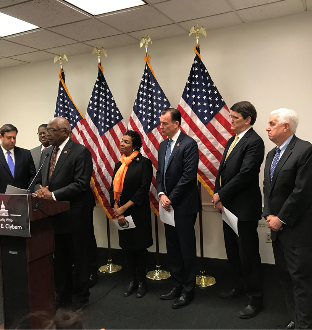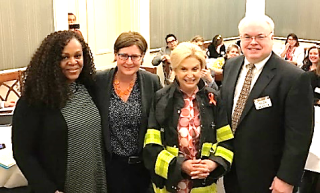There’s a saying that victory has a thousand parents and defeat is an orphan. That adage became especially applicable once the President signed into law the repeal of the tax on nonprofit transportation benefits. The repeal is a community-wide accomplishment to celebrate, thanks to thousands of individuals and organizations united in common purpose.
What did it take to secure the repeal? It’s easy to learn from mistakes, but harder to learn from success without giving special attention. So, let’s look back at the work done over the last 20 months to see what can be learned from this collective achievement. We didn’t see every action taken by the thousands of advocates, but we know what we did and what we saw.
Tip of the Iceberg

From the outset, let’s be clear that repeal of the tax on tax-exempt organizations was a bipartisan affair. Early on, Senators Lankford (R-OK) and Coons (D-DE) prodded the Treasury Department to lessen the impact of the tax through regulations and cajoled their congressional colleagues toward repeal. When Members of Congress called a news conference to introduce repeal legislation, the National Council of Nonprofits was honored to speak at the event (see photo at right) with other nonprofit groups and provided testimony when invited to testify before the House tax committee. We also framed the issue by conducting the research and submitting detailed legal and policy analyses to Treasury and the IRS demanding clarification and delay of implementation (and successfully encouraged others to do likewise).
The Network’s Role Among the Many
The National Council of Nonprofits, working with and through our network of state associations of nonprofits, utilized every advocacy tool available, including:
- Mobilized grassroots organizations by the thousands to generate large volumes of calls, emails, and tweets from across the country to their elected officials;
- Targeted grass-tops communications from the states to key lawmakers at critical times in the process;
- Wrote more than 39 articles on the issue in our policy newsletter, Nonprofit Advocacy Matters, to raise awareness, including 16 calls to action to promote regulatory and congressional actions – and state associations communicated similarly;
- Filed multiple sets of public comments with Treasury and the IRS calling for delay and clarification, as well as with Congress calling for repeal, including this letter signed by more than 600 organizations across the country;
- Engaged the media, prompting timely news coverage and writing numerous op-eds and blogs;

Michigan Nonprofit Association and our Board Chair;
Sharon Stapel, Executive Director of Nonprofit New York;
Rep. Carolyn Maloney (in firefighter’s gear),
and our President & CEO Tim Delaney, at 2019 Lobby Day
- Held personal meetings with lawmakers and staff – including during our Lobby Day on the Hill and back in their district and state offices;
- Participated in various coalitions, in strategy sessions and scores of meetings on the Hill;
- Conducted a nationwide survey, promoted through the Advocacy Matters newsletter and communications from state associations, to gather real-world insights to show the harm of the tax and packaged hundreds of spot-on quotes from nonprofit professionals in dozens of customized drop-off sheets.
- Activated social media: Thanks to an inspiring survey response expressing frustration about the new tax on transportation benefits (“Does Congress expect us to be superheroes who fly ourselves to work?!”), we developed a successful social media campaign of a caped hero still needing public transit (see example in photo at left). That leader’s quip of frustration proved, once again, that frontline nonprofits have the most persuasive insights that advocates must seek out and channel for effective advocacy communications.

Real-world insights also flowed from achievements in Hawai`i, Illinois, Minnesota, New York, and North Carolina, where our nonprofit state association colleagues secured state legislation blocking additional state taxes triggered by the federal tax. Their successful state-level advocacy, convincing state legislators to reject such a tax, rebuked Congress by demonstrating that UBIT on transportation benefits was bad policy.
Partners Rally and Coalitions Rise
We saw many partners likewise pulling out all the stops and new coalitions emerge. Here’s a sample of only a few of the thousands of advocates we saw in action:
ASAE built a powerful coalition of trade associations, social welfare groups, charitable nonprofits, and religious organizations, set up lobbying meetings, and helped coordinate communications among the various groups.
The Union of Orthodox Jewish Congregations of America stood up early and publicly against the tax, engaged its member congregations around the country, and participated actively in lobbying meetings on the Hill.
Likewise, the Church Alliance of benefits programs, Ethics & Religious Liberty Commission of the Southern Baptist Convention, Evangelical Council for Financial Accountability, Jewish Federations of North America, National Association of Evangelicals, and many other national, state, and local faith-based organizations circulated sign-on letters and promoted direct advocacy, crafted key messages relevant to their members and audiences, and pressed those messages when Members of Congress were home and in direct lobbying activities.
And our usual infrastructure collaborative partners at the national level – including the Council on Foundations, Independent Sector, League of American Orchestras, National Human Services Assembly, United Philanthropy Forum, and others – engaged diligently to get repeal across the finish line. This nonprofit community letter from more than 100 organizations to congressional leaders is just one example of this collective advocacy.
It’s fair to say that by the time repeal happened, there was not a single Member of Congress – Senator or Representative – who believed taxing the transportation benefits provided to nonprofit employees was a good idea. Indeed, all agreed repeal was the only answer. But getting to a unanimous view was only the result of aggressive, persistent advocacy by thousands of nonprofits across the country.
As just one of the thousands of other proud parents of this repeal, I close with thanks and congratulations to each and every person who played a role in this successful effort.
